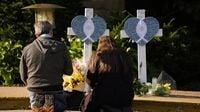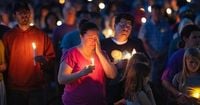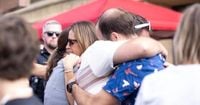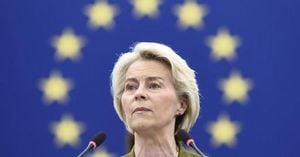The community of Minneapolis is reeling after a devastating mass shooting at Annunciation Catholic School on August 28, 2025, which left two children dead and 18 others wounded during a morning Mass marking the first week of school. The tragedy, which unfolded with chilling precision, has prompted an outpouring of grief, calls for action, and renewed debate over gun violence and mental health in America.
According to ABC News, the two students killed were Fletcher Merkel, 8, and Harper Moyski, 10. Fletcher, remembered by his father Jesse Merkel as a boy who "loved his family, friends, fishing, cooking and any sport that he was allowed to play," was mourned deeply by his family and community. "Because of their actions, we will never be allowed to hold him, talk to him, play with him, and watch him grow into the wonderful young man he was on the path to becoming," Jesse Merkel said, urging parents to "give your kids an extra hug."
Harper Moyski, described by her parents as a "bright, joyful, and deeply loved 10-year-old whose laughter, kindness, and spirit touched everyone who knew her," was also taken too soon. In a statement provided to KSTP, her parents Michael Moyski and Jackie Flavin shared, "As a family, we are shattered, and words cannot capture the depth of our pain." They also emphasized the importance of ensuring Harper’s memory "fuels action," calling for meaningful change to prevent similar tragedies.
The shooter, identified as 23-year-old Robin Westman, was a former student at Annunciation Catholic School. Police said Westman fired 116 rifle rounds through the church’s stained-glass windows just before 8:30 a.m., as reported by the Associated Press. Armed with a rifle, shotgun, and pistol—all legally purchased—Westman targeted the congregation during a time of prayer and reflection. Eighteen people, including 15 children and three elderly parishioners, sustained injuries but are expected to survive.
Authorities found Westman dead in the parking lot from a self-inflicted gunshot wound. The FBI is investigating the attack as an act of domestic terrorism and a hate crime targeting Catholics, a point underscored by the hateful ideology found in Westman’s writings and online videos. According to Minneapolis Police Chief Brian O’Hara, investigators recovered hundreds of pieces of evidence, including journals, electronic devices, and a video manifesto posted to YouTube. The manifesto, analyzed by BBC Verify, revealed Westman’s desire to "attack a large group of kids" on the first day of school and included detailed plans, diagrams of the church, and a fixation on maximizing harm.
Westman’s background paints a portrait of deep-seated alienation and mental health struggles. Former classmates recalled Westman as quiet, withdrawn, and resentful of school, with one classmate telling AP, "I remember they had a crazy distaste for school, especially Annunciation, which I always thought was pretty interesting because their mom was on the parish board." Westman’s mother, Mary Grace Westman, worked at the school and parish for several years, but attempts to reach her for comment have been unsuccessful.
The shooter’s online presence was equally disturbing. Videos posted to a YouTube channel under the name "Robin W" showcased weapons, ammunition, and graffiti with messages such as "kill Donald Trump" and "Where is your God?" The videos also included apologies to family, admissions of long-standing depression and suicidal thoughts, and references to more than 15 previous mass shooters, both in the U.S. and abroad. The last journal entry was dated August 21, just a week before the attack.
Law enforcement officials have not identified a specific trigger for the attack, but U.S. Attorney for Minnesota Joe Thompson told The New York Post that Westman "wanted to kill children, defenseless children," and that the shooter’s writings revealed hate "toward almost every group imaginable." The only group Westman admired, authorities said, were other mass shooters. The shooter’s familiarity with the school and church layout, gleaned from years as a student and from information posted online, enabled a meticulously planned assault on the community’s most vulnerable members.
In the aftermath, the response from families, first responders, and the broader Minneapolis community has been marked by both sorrow and resilience. Jesse Merkel praised the "swift and heroic actions of children and adults alike, from inside the church," noting that "without these people and their selfless actions, this could have been a tragedy of many magnitudes more." Harper Moyski’s parents echoed this gratitude, saying they were "grateful for the staff and first responders who did so much for so many yesterday."
The attack has reignited calls for stricter gun control laws at both the state and federal levels. At a rally at Minneapolis City Hall, Minnesota lawmakers, clergy, and gun control advocates called for bans on assault weapons and high-capacity magazines. "There is no reason that someone should be able to reel off 30 shots before they even have to reload," said Minneapolis Mayor Jacob Frey, as reported by The Independent. Frey continued, "We’re not talking about your father’s hunting rifle here. We’re talking about guns that are built to pierce armor and kill people." Representative Ilhan Omar, who represents the area in Congress, added, "It shouldn’t be hard to ban assault weapons and high-capacity ammunition. What is hard, is being a mother, having just dropped off your babies... and receiving that phone call... that your two angels are no more."
The shooting has also drawn solidarity from communities affected by similar tragedies. Families of victims from the Uvalde and Apalachee High School shootings sent wreaths and messages of support to the Annunciation community, underscoring the shared pain and determination to prevent future violence.
As the investigation continues, the focus remains on healing and on the urgent need for change. The families of Fletcher Merkel and Harper Moyski have urged leaders to address both gun violence and the mental health crisis, warning that "no family should ever have to endure this kind of pain." Their voices, and those of countless others touched by this tragedy, are a sobering reminder of the stakes—and the work that remains.






